Do pregnancy belts help with lower belly pain when pregnant? by Tabitha Webb

In pregnancy we experience a whole host of new sensations. Some are exciting – especially when your new baby starts to move around – but others can be uncomfortable or just plain confusing. One of these not-so-exciting sensations is called round ligament pain.
What might I feel?
Round ligament pain is felt low in the abdomen, just above the pubic bone and out to the left and right sides. You might notice it as you do big, abrupt movements such as changing direction, rolling over, twisting, coughing, sneezing, and getting in or out of a bed, a chair or your car. It is usually described by those who experience it as a sharp jabbing or pulling, and while it can affect both sides or only one it is most commonly felt on just the right side. It is a very normal part of a healthy pregnancy and is mostly likely to be felt in the second trimester.
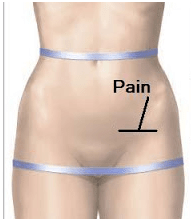
What are my round ligaments and why do they hurt?
Every woman has many ligaments that sustain the uterus in its usual forward tilt. The two round ligaments start from the top and front of the uterus (one on the left side and one from the right), and run forward and inward towards the groin where they attach to the pubic bones.
During pregnancy, as the baby grows larger and the uterus has to expand, these ligaments come under much more pressure and must elongate. At the same time they also start to bear a lot more weight than usual of your growing uterus, baby and placenta. Also, while the pregnancy hormone relaxin helps all the ligaments in your body become more flexible, the round ligaments become very flexible and can stretch too far, too easily. Because of these factors, sudden quick movements that pull on these ligaments can create short, sharp, and jabbing pains. The discomfort usually only lasts for a couple of seconds before disappearing.
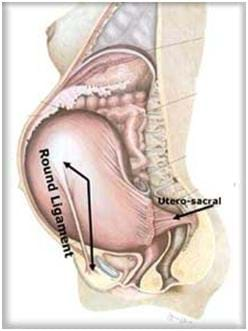
Should I be concerned?
As expecting mothers, we can often worry about abdominal pains, and you should definitely have them checked by our doctors to rule out anything serious if you are concerned. But if the round ligaments are found to be the root cause of the pain, it can be reassuring to know that this is a normal and healthy experience and not a sign of anything being wrong in the pregnancy.
What can be done to help?
Here are some easy tips to alleviate the jabbing pains of your round ligaments.
- Be mindful to move more slowly and gently while you are pregnant and to gently engage your pelvic floor and deep abdominal muscles during big movements like rolling over, changing direction and coughing or sneezing. Ask us to show you how!
- When lying on your side try propping up your bump from underneath with a small cushion or rolled up towel between it and the bed or yoga mat to prevent it hanging down and dragging on the ligament. See the picture below for an example.
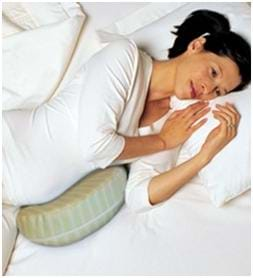
- Ask your physiotherapist whether a pregnancy belly and lumbar support belt might be helpful for you. These gently support and stabilise your bump and lower back and reduce excessive, sudden stretch on the round ligaments and therefore can reduce the associated pain. We have some great ones in stock currently which are helping some of our ladies right now.
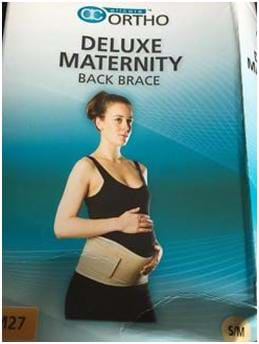
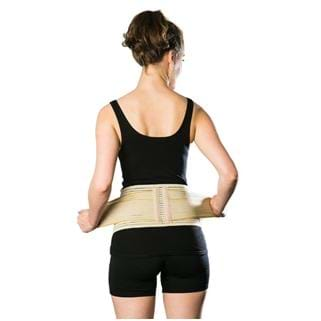
- It can help to do some safe and gentle pregnancy-specific Pilates exercises under the direction of a physiotherapist. This will help to keep your deep abdominal, pelvic floor, and buttock muscles supporting you as well as possible. Working with your physiotherapist to practice the most supportive postures and ways to move and exercise can also help. We cater to this specifically in our prenatal pilates classes, and individual sessions and physiotherapy consults are always available
So don't suffer through the pain in silence – talk to your doctor or any of the staff at The Fix Program about how to prevent and manage round ligament pain, and look after and support your round ligaments as they look after and support your growing bub, for a more comfortable and pleasant pregnancy.
Join an online class from the comfort of your home - Katrina the principle physio at The Fix Program has designed a series of pregnancy exercise programs that will help you immensely. ![Online pregnancy pilates]()